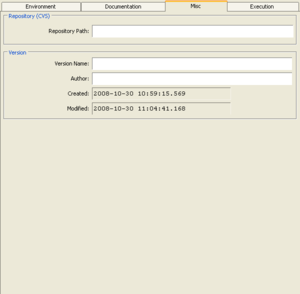Testsuite Editor-Metadata Editor/en: Unterschied zwischen den Versionen
Ca (Diskussion | Beiträge) (Die Seite wurde neu angelegt: „thumb|300px|Misc Editor (outdated screenshot) The misc editor is used to view and edit some miscellaneous settings and additional info…“) |
Sv (Diskussion | Beiträge) K (Sv verschob die Seite ProjectDescriptionEditor-ProjectMetaDataEditor/en nach Testsuite Editor-Metadata Editor/en, ohne dabei eine Weiterleitung anzulegen) |
(kein Unterschied)
| |
Version vom 2. April 2014, 18:31 Uhr
The misc editor is used to view and edit some miscellaneous settings and additional information for the testsuite. It can be found on the "Misc" tab after selecting the test suite in the navigation tree.
To the right, you see an example for an opened misc editor.
Inhaltsverzeichnis
Version[Bearbeiten]
- Release Name
An optional field for a descriptive name of the test suite's version. - Author
An optional field for the name of the test suite's author (fille in automatically). - Version
This shows an internally generated version number useful to quickly identify the current version. It is constructed from a sequential number and the suite's last edit author. The sequence number will be incremented whenever the suite is saved.
Project File Path[Bearbeiten]
The path to the file from which the current testsuite was loaded. Only used for documentation.
Library Interface[Bearbeiten]
For a concrete library, this field specifies which virtual library interface is implemented by this library. For more information please read the section on virtual activities.
Prerequisites[Bearbeiten]
Expecco Version[Bearbeiten]
Allows for the minimum required expecco version for this test suite to be specified. If this suite is loaded into an older expecco, a warnbox will appear (this is useful for libraries which call into the expecco API and use functions which are not present in older versions).
Extension Packages[Bearbeiten]
Lists required extension packages from the underlying execution framework. This is especially used by plugin-libraries which require additional low-level dll functionality. Packages are named using the standard Smalltalk/X pacakge naming scheme (foo:bar/baz/...). For an extension package to be found, it must be located below the expecco installation directory in a directory named "foo/bar/baz/..." under the "packages" subfolder.
Plugin UUIDs[Bearbeiten]
Lists the required plugin's id(s). Used by libraries which require a specific plugin to be present. Especially used by plugin-libraries which implement a block interface to the plugin's operations. To verify at package loading time, that any API entries used by extension blocks will be present at execution time.
Load / Unload[Bearbeiten]
Allows for an action to be automatically executed whenever the suite (or import library) is loaded / unloaded. This can be used to check for the availability of hardware, software or to give additional information automatically to a test operator. To use this, simply drag and drop an existing activity block into one of these fields.
GUI Extensions[Bearbeiten]
Allows for a folder full of actions to be attached to expecco's main-menu. If a folder is dropped into that field, all of that folder's actions are presented as menu items in the "Extra" menu. This is very useful to make common functions (calibration, test-setup, teardown etc.) easily accessable to the test-operator. The action is executed whenever the corresponding menu item is selected, independent of any ongoing test executions.
Testplan Execution[Bearbeiten]
Allows for additional pre- and post-execution actions to be automatically executed with any testplan execution. Different actions can be specified depending on the testplan's outcome, for example to trigger further reporting or alarm processing.
Back to the Project Editor
For other editors see: Editors
The full online documentation can be found under: Online Documentation
